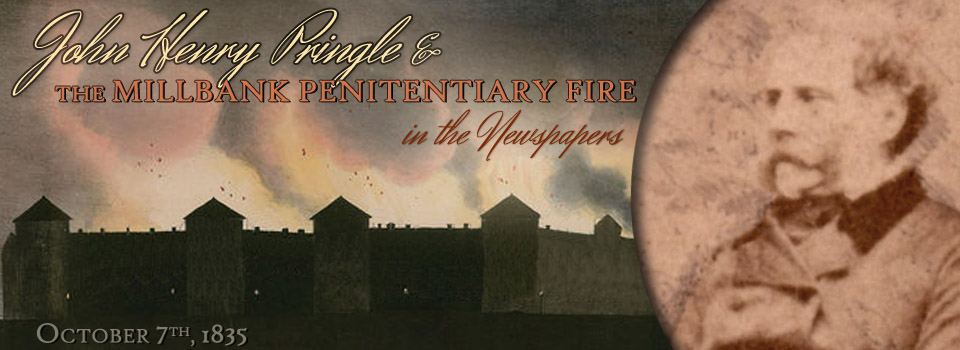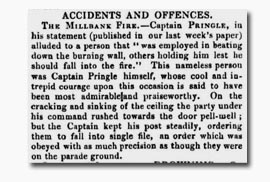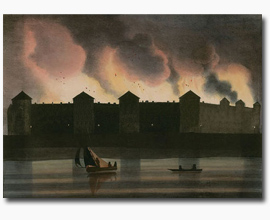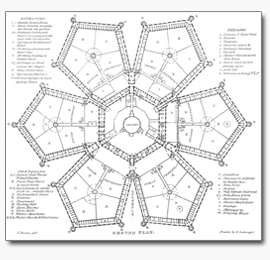Newspaper Accounts of J.H. Pringle and the Millbank Fire
These article transcriptions describe the great fire at the Millbank Penitentiary (and John Henry Pringle's heroic actions there) on the seventh of October in 1835. Articles are arranged in chronological order by date of publication.
"Morning Post" 10 Oct 1835, page 6:
THE PENITENTIARY FIRE.
To the Editor of the Morning Post.
Guards Club, Oct. 9, 1835.
Sir — I have to communicate to you the substance of this letter with the request that you will insert its contents in your journal, in consequence of the undermentioned paragraph appearing in the "Morning Post" of to-day in an article which pretends to be an account of the late fire at the Penitentiary:—
"Great damage has been sustained through a party of the Guards throwing several bedsteads and other things into the yards from the top floors, and at some distance from the fire, although they were several times cautioned of its impropriety by the firemen." I beg leave to acquaint you, Sir, that the acts commented upon in these words were done by my orders and on my responsibility, as I conceived them essentially necessary to the preservation of the building, and with regard to their being done "at some distance from the fire," I have to observe that the room in which the party alluded to (some of the Coldstream) were at work was the last room still covered with a roof in that range of building called the infirmary, which roof was on fire, part of the wall of which was burnt through, and had fallen into the flames, and that at one of its doors a person was employed in beating down the burning wall with a crowbar, others holding him lest he should fall into the fire. That in no part of the room wall could one place one's hand unburnt, and that when the room was first taken possession of by our party there was a dense smoke issuing, and fire coming on to the floor through the wall and door. That twice the men were ordered to quit the room from the roof sinking and the ceiling cracking, and that their Commanding Officer, Sir W. Gomm, attended by his Adjutant, Captain George Knox, inspected the room where one party had worked, and gave his unqualified approbation to those operations. And, Sir, these were not seen by the military alone, I obtained at the time the address of one person present, a clerk in the establishment, who was especially active in keeping up our communication with the civile authorities and in all endeavours to save the building. This Gentleman's name is Franks, and he desired that we should commence working further off than we did, as the fire seemed gaining too fast upon us; which opinion we overruled. Expedition appeared so necessary that, a party who were sent out to obtain tools not returning so shortly as was hoped for, I felt obliged to convert the iron bannisters of the stairs into crowbars. But not, Sir, with reference to myself would I have troubled you with this letter: I wish to prevent so hard a thing as that any statement should go forth to the public calculated to damp the ardour and check the zeal of a body of men who, on this occasion and all others, were and are ready to do their duty. A few words more, Sir. If the person who wrote the paragraph alluded to by me was the spectator of the scene, he is the broacher of a wilful lie; and, Sir, if he was not a spectator of the scene, he is the author of a flippant impertinence. With many apologies for troubling you, I have the honour to be, Sir, your most obedient humble servant,
John Henry Pringle
Lieut. and Captain, Coldstream Guards.
"Morning Post" 12 Oct 1835, page 4:
THE FIRE AT THE PENITENTIARY
. . . To the Editor of the Morning Post.
General Penitentiary, Oct. 10, 1835.
Sir— I should feel greatly obliged by your allowing me to bear testimony to the correctness of the observations of Capt. J.H. Pringle, in your journal of this day, on the misapprehension of the conduct of the Guards at the late fire at the Penitentiary. I am the person the Captain alludes to in his letter by the name of Franks (a mistake, it should have been French), and was therefore an eye-witness to the conduct of the Guards complained of by the firemen. I do not feel it necessary to add any reasons to those already given by Capt. Pringle to show the necessity of the course pursued by him and his men, but I do feel it a duty to make such mention of him and his services as his modesty has concealed. He says, "a person was employed in beating down the burning wall, others holding him lest he should fall into the fire." This nameless person was Captain Pringle himself, and I several times endeavoured to force him from his perilous situation. Having been several years engaged in the sea service, I have witnessed many instances of cool and intrepid courage; but none more admirable and praiseworthy than that displayed by Captain Pringle on this occasion. On the cracking and sinking of the ceiling the party under his command rushed towards the door pell-mell; but the Captain kept his post steadily, ordering them to fall into single file, an order which was obeyed with as much precision as though they were on the parade ground. I trust, Sir, you will see that the bearing public testimony to conduct like this is but an act of justice on the part of those who witnessed it. — I am, Sir, your obedient servant, T.B. French.
"Sherborne Mercury" 12 Oct 1835, page 3:
FIRE AT MILBANK PENITENTIARY.
On Wednesday night, a few minutes after seven, a most alarming fire broke out at the Penitentiary, Milbank. Information was immediately dispatched to Queen-Square Police-Office, and the whole fo the officers of that establishment were immediately ordered to be upon the spot well armed, to prevent any confusion that might arise in consequence of the number of prisoners in confinement. In addition to this, a strong detachment of the A division of Police very quickly came up. Nearly the whole fo the engines of the various metropolitan fire-offices came in very speedily, but their exertions were very much impeded by the scanty supply of water. It would appear that the fire originated in the laundry, and the Infirmary was threatened with destruction; the whole of the inmates of the latter were therefore removed and placed in another part of the prison. In spite of the exertions of the firemen and police, who assisted them in working the engines, the fire raged furiously, and threatened the destruction of the greater part of the building. The flames up to half past ten continued to spread with devouring rapidity. The whole of that part of the infirmary devoted to the female prisoners was completely destroyed. All the prisoners, male and female, labouring under disease, were removed to the chapel, to which the flames had not then communicated. It was some considerable time before an adequate supply of water could be obtained, and the engines brought into full play, but then they played upon the burning element most vigorously. Great credit is due to a fireman of the County Fire-Office, who by his exertions in cutting off the communication from one wing to the other has preserved the eastern pentagon. By nine o'clock a detachment of the Scots Fusileer Guards [sic. — should be Coldstream Guards] marched into the interior of the prison, and with the police assisted in working the engines. The Queen-Square Magistrates were giving directions and in active attendance upon the spot shortly after the fire was discovered. The Governor of the prison and the Rev. Mr. Russell, the chaplain, had all their furniture removed from their residence to another part of the building for safety. The alarm and anxiety of the prisoners, who were watching the progress of the flames through the iron gratings of their cells, appeared to be excessive; but every precaution was taken to secure them in case of necessity. It is generally supposed that the fire originated in consequence of some imperfection with regard to the flue of the hot air stove with which the laundry is heated.
At twelve the conflagration appeared to be diminishing, but so great was the fear of its further progress that the Governor gave direction that a part of the buildings should be pulled down to prevent the flames from spreading. The cells of the prisoners and the most important parts of the Penitentiary are fire-proof. At a late hour Viscount Melbourne, Lord Bexley, Sir William Gomm, and several other gentlemen of rank, were present, and took an active part in directing the firemen and police. The Vauxhall Road was lined with hundreds of spectators, and the fire appeared to illuminate the atmosphere for miles round. A serjeant's guard was posted outside the gates of the Penitentiary, to remain there until all alarm had subsided.
The following particulars were collected inside the prison. The fire, it appears, commenced at about seven in the laundry, in consequence of the house-horses catching fire. On being observed, an alarm was instantly given, and every exertion used to extinguish the flames, but they soon communicated to the walls, which consisting of light materials they spread with the most alarming rapidity. Captain Chapman, the Governor of the prison, immediately gave orders for all hands to commence work to put out the flames, but they communicated to the various parts of the building on the north side, so that he entertained strong fears that the whole of the place would be destroyed, and gave immediate orders to have the whole of the inmates of the infirmary removed to the chapel for safety, and the other prisoners were secured in other parts, which appeared not to be in immediate danger. The cries of the prisoners could be heard prior to their removal; but everything was done for their safety, and to appease their fears.
By eight o'clock the conflagration arrived at such a pitch, that it was the full impression that every particle of the prison would shortly be a scene of devastation. Many parts of the interior consist of dry wood, and the wind being in an easterly point, it encouraged the flames to spread in the direction of the chapel, where numerous prisoners were placed, and the greatest fears were entertained for their safety. At length Mr. Mayne, Captain Pringle, and other persons consulted with Mr. White, the magistrate, upon the propriety of pulling down several parts of the building, to prevent further communication with the flames; and Mr. White having concurred in the propriety of the proposal, a strong body of workmen proceeded to the roof, and with pick-axes, saws, and other implements, commenced operations at the risk of their lives.
By nine o'clock the female side of the prison was nearly in one complete blaze, and it was greatly feared that the flames would reach the chapel, and the men were ordered to break down that part of the building adjacent thereto, in order to preserve it. The Governor's house also was threatened with destruction through the same medium. The roofs of the various apartments fell in with a tremendous crash, at about ten o'clock, by which time the fire had considerably increased, notwithstanding the exertions made to keep it down.
At length information was forwarded to Lord Melbourne, and at eleven his Lordship arrived at the prison, and had an interview with Captain Chapman and the magistrates, &c. His Lordship made minute inquires as to the origin of the fire, and whether the prisoners were all safe, and as to the means taken to subdue the flames. He also, with evident solicitude, inquired whether any lives had been lost or any serious accidents had occurred.
As to the arrangements which had been previously made for pulling down the various parts of the buildings, in order to prevent the flames communicating to other more important parts of the edifice, his Lordship highly approved of them. The fire continued to burn rapidly until half-past twelve o'clock, when it was considerably got under; but the engines still continued to play upon the premises with great activity.
Various reports were circulated outside. It was stated that during the day a large quantity of coke had been received into the prison, and the fires were made too brisk in the laundry; that at first it had the appearance of a chimney on fire; and that when the fire spread, the shrieks of the prisoners could be plainly heard outside the building.
Nearly the whole of the Infirmary (pentagons No. 3 and No. 4) is destroyed. Captain Pringle, who commanded the Guards, was indefatigable in his exertions in encouraging the men, as was also Captain Chapman, the Governor, and Mr. Mayne, one of the Commissioners of the Police. At eleven the prisoners, who had been mustered in the yards, in case of necessity, should the fire have extended, were removed to their respective cells. At the above hour the military drew up in a line in the outer courtyard preparatory to their departure, it being considered that all fear of the prisoners' safety was at an end. At half-past eleven the police dispersed the immense multitude which was assembled around the walls of the prison, and the military also left, all fear of further mischief having subsided. The amount of damage cannot yet be ascertained.
At twelve the Governor gave directions for the communication with another pentagon to be cut off. The engines of the West of England Fire Assurance Company in the Waterloo-Road were the first that arrived, and had there at that time been a plentiful supply of water the progress of the flames might have been retarded. In the cutting off of one of the communications, three of the West of England firemen nearly lost their lives by a portion of the roof falling in and precipitating them with great violence upon the floor beneath. By half-past twelve the fire was so far got under that no danger existed of its extending to any other part of the building. The damage must be very considerable.
"Staffordshire Advertiser" 17 Oct 1835, page 4:
THE FIRE AT THE PENITENTIARY, MILLBANK.
On Wednesday se'nnight, a little before six o'clock, the inmates of the Penitentiary, Millbank, were greatly alarmed by a report that a fire had broken out in the laundry, from which place a body of smoke was rushing out at the windows. Capt. Chapman, the governor, directed the gates to be shut, and ordered all the officers of the establishment to the spot, and a messenger was sent for the engines. Pentagon 3 was likely to be destroyed, and the governor had the prisoners (who were women) promptly removed. In a few minutes the first communicated to the pentagon, and continued with unabated violence till near seven o'clock, at which time the engines arrived, and were admitted into the spacious yard of the prison. The women's infirmary was now in danger. The sick were taken away with every possible care. In a very few minutes the engines began to play, and as there was a dike surrounding the prison, which was full of water, there was of course an abundant supply. By this time Mr. Commissioner Maybe, followed by a strong body of police, and two battalions of the Coldstream guards, under the command of Captain Pringle, entered the year. In addition to preventing the violation of the peace, several of them commenced working the engines, from which assistance the firemen were enabled to go on the roof of the building, where with their hatchets, under the superintendence of Mr. Braidwood, they cut away the tiling, to prevent the spread of the fire.
The fire is said to have been owing to the over-heating of the flues on which are placed the clothes horses in the laundry. The great anxiety of the governor was to suppress the fire before it should become necessary for him to take measures with respect to prisoners who might be endangered.
By eight o'clock the conflagration arrived at such a pitch that desturction threatened the prison. Many parts of the interior consist of dry wood, and the wind being in an easterly point, it encouraged the flames to spread in the direction of the chapel, where numerous prisoners were placed, and the greatest fears were entertained for their safety. The ignition of one of the pentagons was rapid and destructive. At length Mr. Mayne, Captain Pringle, and other persons, consulted with Mr. White, the magistrate, upon the propriety of pulling down several triangular parts of the building to prevent further communication with the flames. Mr. White seconded the proposal, and consulted with Capt. Chapman, who also concurred, and a strong body of workmen proceeded to the roof, and with pickaxes, saws, and other implements, commenced operations at the risk of their lives. Several of the nobility and gentry arrived at the prison, and were admitted to the interior.
Information was forwarded to Lord Melbourne, and at eleven o'clock his Lordship arrived at the prison, and had an interview with Captain Chapman and the Magistrates, &c. when his Lordship was conducted round the establishment. His Lordship enquired as to the origin, and whether the prisoners were all safe. Captain Chapman informed his lordship that on discovering the fire, his first object was to remove the whole of them from the infirmary to the chapel, and the others were conducted under proper escort to the other parts of the prison, and he was happy to inform his lordship that they were all safe.
The fire continued to burn rapidly unto half-past twelve o'clock, when it was considerably got under; but the engines continued to play upon the premises with great activity. The military and police were still stationed inside and out of the prison, but the crowd increased during the whole of the night, and Millbank and all the streets leading thereto were lined with people; the tops of the houses, &c. were thronged with spectators, and the nobility and gentry arrived in numerous parties to witness the awful calamity.
Up to a late hour Lord Melbourne, Messrs. White and Burrell, and a strong muster of military officers, with Mr. Mayne, and superintendents, inspectors, &c. remained on the spot.
Although much damage has been done to the buildings on the Westminster side, no life has been lost, nor has any accident been mentioned. The principal injury sustained is at the back of the building, and in the vicinity of the governor's house. In front, toward the river, the building presents the same appearance as ever, and indeed, were it not from the smoke issuing behind, no one would suppose that any thing unusual had occurred. From a careful inspection of the building, and from information obtained from Mr. Braidwood, the superintendent of the London Fire establishment, it appears that the prisoners were never in any thing like danger. A reference to a plan of the prison will show that the chapel is in the centre, and isolated, with the exception of there being four galleries, which communicate with a building that surrounds the chapel at a distance. From each of the angles of the hexagon commences a pentagon, and it is in these pentagons alone that the prisoners are confined, with the exception of the sick, who are lodged in teh haxagonal part, where likewise is the laundry and the residence of the prison. The pentagons are, with the exceptions of their roofs, fire proof, and the only injury here sustained is the burning of the greater portion of the roof of pentagons Nos. 3 and 4, and the fall of many of the stones of the ceiling, which were split by the intense heat. It was by cutting the roofs of pentagons Nos. 3 and 4 that the fire was stopped, after having run rapidly along three of the sides of each. This work was performed by the London Establishment. The equally important work of cutting off the communication in the hexagon was done by the West of England men. The part of the hexagon on fire being that farthest from the river, great difficulty was found in obtaining a full supply of water, and it required a junction of three engines with twenty-five lengths of hose to carry a single stream of water to the part in flames. The sick were alone in danger, and this ceased on their removal to the chapel, for the floors and staircases, excepting in the officers' apartments, being everywhere stone, it was impossible the fire could have attained any great height.
"Bell's New Weekly Messenger" 18 Oct 1835, page 10:
THE MILLBANK FIRE.— Captain Pringle, in his statement (published in our last week's paper) alluded to a person that "was employed in beating down the burning wall, others holding him lest he should fall into the fire." This nameless person was Captain Pringle himself, whose cool and intrepid courage upon this occasion is said to have been most admirable and praiseworthy. On the cracking and sinking of the ceiling the party under his command rushed towards the door pell-mell; but the Captain kept his post steadily, ordering them to fall into single file, an order which was obeyed with as much precision as though they were on the parade ground.




